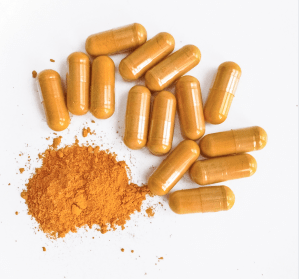Turmeric and Curcumin
Turmeric and Curcumin – The Worlds most powerful pharmaceutical herb!
Turmeric is a main ingredient in curry powder. IT has been called one of the most powerful disease fighting plants known to man! Interest in Curcumin, the main chemical constituent of turmeric has grown wildly recently. This has been in no small part due to the fact that over 6,235 peer-reviewed articles have found time and time again that it is in fact a miracle worker in the body.
Many of these studies have come to an extremely interesting conclusion. When compared to the efficacy of pharmaceutical drugs, curcumin equaled or almost equaled the effects of actual prescription medication. Some studies suggest it is even more beneficial due to it’s lack of side effects.
Here are just a few of the many drugs Turmeric has been reported to match or beat.
Aspirin, Ibuprofen, Naproxen and Celecoxib, Metformin, Azathioprine and mercaptopurine, Prozac and other SSRIs, Corticosteroids, DMARDs and many more.
How does Curcumin do so many things?
Curcumin helps ease inflammation by blocking the effects of two enzymes in the body which cause inflammation. The two enzymes, 5-lipoxygenase and cyclooxygenase-2, have been found to encourage and sustain swelling and inflammation in the human body. Blocking these enzymes reduces pain and the risk of other medical conditions that develop as a result of inflammation.
What are some of these conditions?
- Heart Disease, High blood pressure, High cholesterol levels
- Alzheimer’s Disease
- Cancer
- Diabetes
- Chronic Peptic Ulcer
- Rheumatoid Arthritis
- Chronic Periodontitis
- Ulcerative Colitis and Crohn's Disease
- Chronic Sinusitis
- Chronic Hepatitis

Turmeric For Heart Disease
The medical community in general has shown little interest in curcumin and it's role in heart health. This is despite the many and varied studies proving again and again it's benefit. Curcumin has been called and proven to be a cardioprotective substance.
In one study published in the American Journal of Cardiology, they showed that turmeric extract reduced post-bypass heart attack risk by 56%. Another study published by the journal Nutrition Research in 2012 showed that curcumin, the primary polyphenol in turmeric was as effective as exercise in improving circulatory function in postmenopausal women. Those impressive results have caused some to call curcumin "exercise in a bottle".
Another compelling new study found in the Journal of Nutrition and Metabolism has shown that a daily dose of curcumin significantly improved the blood vessels of healthy adults within a span of two months. The study shed light on what is believed to be the central cause of cardiovascular disease, the inability of the inner lining of blood vessels to open (vasodilation).
Since curcumin has such a great effect on the heart, it makes perfect sense to include it with a nitric oxide booster as it's effects are synergistic.
Turmeric & Cancer
Many studies have proven that curcumin helps prevent various types of cancer including lung, stomach, breast, hepatic (liver) and colon. It halts cancer growth by interfering with the cellular signaling cancer uses to grow.
Studies have proven curcumin can…
- Kill lymphoma cells
- Inhibit COX-2, an inflammatory enzyme which can increase cancer risk
- Preventing regrowth of cancer stem cells
- Starve cancer cells of their oxygen and fuel source
- Turn on anti tumor genes
- Stop metastasis of cancer cells
Curcumin is not well absorbed in the blood but it is in the colon , this fact gives it a distinct advantage in fighting cancerous tissues in the colon. Curcumin also tackles prostate cancer by modulating sex hormone receptors in the prostate gland. It has also been shown to be effective in the prevention of cervical cancer. Curcumin’s anti-inflammatory property blocks the human papilloma virus and activates cancer cell death within the uterine lining.
Curcumin for Diabetes
Many studies suggest that curcumin can in fact decrease the level of blood glucose. Researchers also reported that curcumin may also be effective for diabetes prevention. It has been found that turmeric extract stabilizes blood sugar levels and in turn makes diabetes more easily controllable.
One very interesting study, published by the American Diabetic Association found turmeric extract to be 100% effective in preventing pre-diabetics from developing type 2 diabetes. You would think this would be all over the news. Sadly, the pharmaceutical industry can make no money from this, and they need you to be sick to exist.
Chronic peptic ulcers
Curcumin may also help people with ulcers. There is a big caveat here. It all depends on what the cause of the ulcers is. If it's high stomach acid, some studies show that it will not help. If however, you are like many and have as a root cause the Helicobacter pylori bacterial infection, which is causing the ulcer, then turmeric is your friend.
The Helicobacter pylori bacteria cause peptic ulcers. Treatment can be difficult and currently available medications do not help to ease symptoms. In a recent study curcumin was show to stop growth of all the H.pylori types and strains. Mice infected with H.pylori were given curcumin and were shown to be protected from gastric damage by curcumin intake. This study proves that turmeric has potential in treating H.pylori infections and diseases caused by it such as gastritis.
Curcumin and Rheumatoid Arthritis
Several recent studies have shown curcumin to have anti-inflammatory abilities and have proven it's role in modification of immune system responses. A 2010 clinical trial found that a curcumin supplement provided long-term improvement in pain and functionality. A study done in 2012 on people with active rheumatoid arthritis showed that the individuals who were given curcumin saw decreased Disease Activity Scores as well as a decrease in the number of tender and/or swollen joints over the group not given curcumin. In addition, no adverse effects were seen in the individuals taking curcumin.
Turmeric and Chronic Periodontitis
In a recent study Twenty-five patients participated in a trial of two randomized groups. All had been diagnosed with chronic periodontitis. In this study curcumin was inserted deep within the periodontal pockets, and sites were covered with periodontal dressings. In the end, the curcumin gel group yielded significant improvement over the control group when comparing them against one another via intergroup analysis. These results tended to gain in statistical significance in later time intervals, implying continued improvements over time and with multiple applications of curcumin.
In the past few years several studies have substantiated curcumin’s effectiveness and supported its therapeutic potential as an armament to protect patients from the ravages of serious and chronic disease.
Ulcerative Colitis and Crohn's Disease
A study was conducted on curcumin and its benefits for patients with ulcerative colitis. The study was was a randomized, double-blind, multi-center trial. 45 patients were given 1g curcumin after breakfast and a similar dosage after the evening meal. It was determined based on endoscopy examinations and through a symptom rating scale that those treated with curcumin suffered fewer disease symptoms on an average compared to those given the placebo. The conclusion was made that turmeric is a safe and promising medication that may be used in the treatment of quiescent ulcerative colitis.
Another study was done to determine the use of curcimon in the prevention of ulcerative colitis. Male Swiss albino rats were given dextran sulfate sodium (DSS) for 5 days to induce colitis. One group was given 100mg/kg curcumin for 7 days before being given DSS. The rats being given curcumin suffered less weight loss than the control group. Typical symptoms of ulcerative colitis that were induced by DSS like infiltration of inflammatory cells, thickening of intestinal walls and mucosal ulceration were much reduced. Researchers believed that the reason could be the antioxidant properties of turmeric and inhibition of NF kappa-B a cellular inflammatory agent. Curcumin may play a protective role by regulating anti-oxidant balance and modulating release of certain inflammatory endocoids in cases of ulcerative colitis. It was also found that even small doses of < 0.25% turmeric was sufficient to provide protection and this could be got by including this spice in food.
Curcumin and Chronic Sinusitis
When the nasal tissues are inflamed (sinusitis), the airways are blocked, trapping the mucus in the sinuses. The trapped mucus then creates an environment that is perfect for growth of bacteria and viruses. The Trapped mucus then places excessive pressure on the surrounding areas of your head causing pain and inflammation. Since curcumin reduces inflammation and may even reduce the allergic symptoms that caused the sinusitis in the first place, curcumin works on all fronts to reduce the swelling and inflammation.
Curcumin and Chronic Hepatitis
Turmeric has a unique property that helps fight the Hepatitis C virus. Although it may not be as potent as one of the new Hepatitis C antiviral drug combinations, a study published in a 2014 edition of the journal Gut evaluated affordable antiviral strategies targeting the early stages of Hepatitis C infection.
The researchers looked at the potency of turmeric as a Hepatitis C entry inhibitor. They determined that turmeric inhibited Hepatitis C entry regardless of viral genotype. In human liver cells, the researchers concluded that turmeric affected membrane fluidity by impairing Hepatitis C virus binding and fusion. Supplementing with turmeric provides an inexpensive means of protecting liver cells from being infected with Hepatitis C.
Some doctors are being advised now that curcumin supplementation is indicated during both Hepatitis B and C infection and during their treatments.
What is better for the heart: CoQ10 or Arginine?
As far as my heart health is concerned which is better to take CoQ10 or the amino acid l-arginine?
So the answer is that they work in different ways and both are great. But let's talk about the difference.
CoQ10:
We will start there. It's a ubiquitous chemical or molecule in your body that is used to really help your cells to make cellular energy. So it causes the mitochondria then to generate ATP energy and what cells in your body have the most mitochondria and the most need for creating ATP? It is your muscles. Your muscles because of what they do. The more you work out and the more active you are the more you really could use things that help you to stoke up cellular energy.
shape especially the younger someone is the better shape that their muscles
are in. But, we know that there's a lot of young people that still have heart attacks and many times it's not because of the heart muscle itself so much as it is the pipes... the arteries that are leading into the heart like the coronary artery as well as other arteries that feed the heart muscle that become clogged.
The oxygenation is cut off. If they get a clot the arteries can become completely obstructed and that's why heart attacks occur; the arteries become obstructed and then of course it affects the heart. It causes portions of the heart to go dead. That can be hard to reverse. But, again, for many people it's really the arteries that's the problem.
So CoQ10 is an excellent supplement for people with heart issues.
Arginine:
But, arginine even more so because of it being a precursor to nitric oxide. Nitric oxide is your body's best medicine to be able to keep your arteries healthy and in turn keeping your heart healthy.
Incidentally, amino acids like arginine also facilitate ATP production in the mitochondria as well so it has that benefit. But, let's go back to its benefits for nitric oxide. Your endothelium takes arginine that your body makes or that you get from your diet and supplementation and converts it into this gas called nitric oxide. Nitric oxide is responsible for opening your blood vessels and relaxing them and it helps to prevent plaque from starting in the first place.
The word picture that Dr. John Cooke used was that it keeps your arteries from becoming like Velcro and helping them to be more like Teflon where everything just slides through. So it helps prevent plaque from occurring, but also over time if there is plaque it actually helps the plaque to go away. I used to enjoy speaking with Dr. Prendergast and he talked about how you could reverse at least 10% of your plaque per year using arginine therapy or arginine supplementation.
So as far as your heart is concerned, long-term prevention, as well as a reversal of plaque in the arteries(which is the number one reason people have heart attacks), then arginine is in my opinion the most important thing for the heart. Especially when you get past forty years of age.
If you want to supplement arginine along with a good ubiquinol or ubiquinone, 100 to 200 milligrams a day, that's an excellent thing. But, I would start with arginine. Dosage is important. At least 5000 milligrams per day along with high doses of citrulline to help for the turbo-charging and recycling effect of the arginine.
Arginine is where I would spend my money. In particular arginine based supplementation is necessary to elevate those nitric oxide levels that tend to decline after you hit age forty. You produce about 50% of the nitric oxide levels as compared to when you were twenty. That's why we see all these complications with heart attacks and strokes particularly after those years.
So I hope this helped as to which is best for your heart: COQ10 or arginine. I would start definitely with arginine supplementation to keep those arteries that lead to the heart nice and clean and then if you want to supplement with CoQ10 in addition, especially if you're on a statin medication, and since as we know that it robs your body of all CoQ10 and long-term very detrimental.
Dr. Sinatra mentions how this can lead to heart failure when you're on a long-term statin program. SoCoQ10 will be very invaluable at that point. Hopefully this helped to answer that question! Thanks for those good questions and keep them coming!
Check out what is best for you at:
https://bionoxusa.com/collections/home-page
Can Heart Disease Cause Depression?
Many diseases, such as heart disease and cardiovascular diseases come with feelings that can be classified as depression. If you have a bad flu, no doubt you will feel despondent, tired, and depressed. The same is true of hypothyroid disease, something that is often misdiagnosed as depression. Is it any wonder then that something as vital as your heart, if not working properly, could cause depression?
One popular dictionary defines depression as “feelings of severe despondency and dejection”.
Depression is now recognized as a risk factor for cardiovascular disease just like other illnesses and risk factors like diabetes, high blood pressure and smoking.
How are heart disease and depression linked?
One way is via stress. When under stress your body releases stress hormones like cortisol that can increase the risk of heart problems. Stress hormones are thought to be related to a host of mental health conditions including anxiety and depression. When not controlled correctly stress can lead to arterial damage, high blood pressure, irregular heartbeats as well as a weakened immune system.
The other more obvious way is simply systemic. If your heart is not working correctly, and your veins and arteries are damaged or full of plaque, you won’t feel good. Your body will suffer higher levels of inflammation. Hormones needed to repair your body won’t get to where they need to go as fast. Nutrients that need to be delivered to your cells will not be absorbed, all factors that will make you feel depressed!
Chicken or the Egg
Determining if you have depression and that is worsening a heart issue, or if you have a heart issue and that is making you feel depressed can be tricky!
Regardless of the origin, heart disease and depression can both be tackled physically and mentally.
Physical
If you have heart disease or cardiovascular issues there are two basic steps you can take to halt and even reverse the problem. The first step is to change your diet. With so many articles and information out there on this subject, it’s unnecessary and exhaustive to go into detail here. Search for heart-healthy diet options online and you will find plenty of information on the subject. Suffice to say, you need to change your diet by moving away from processed foods, and items high in bad types of fat.
The other physical component to healing heart disease and that also can help depression is supplementing with the amino acids L-Arginine and L-Citrulline. These two powerful healing amino acids when combined have been shown to reduce plaque build-up in the arteries and veins, reduce inflammation and help open your veins and arteries. They work by stimulating the production of Nitric Oxide, a substance that has been studied literally hundreds of thousands of times and shown to provide real results in study after study.
How they help the heart is rather straightforward. The removal of plaque and the healing of arteries clean out your cardiovascular system and help it heal. It makes the veins and arteries more elastic, returning them to a more youthful state. This helps reduce high blood pressure and can reverse the symptoms of cardiovascular disease.
How do arginine and citrulline help with depression?
If you have heart disease and your body is in a state of inflammation due to damaged arterial tissue and plaque build-up, it affects your entire body including your mind. A recent study found that even just having dry skin can cause so many inflammatory markers to be produced in the body, that it is now considered a major contributing factor for Alzheimer’s Disease. If something on the outside of your body can cause brain issues, how much more so can something directly linked to your brain ( your circulatory system ) cause issues if it’s not healthy?
By helping to heal your circulatory system, you reduce inflammation and increase blood flow at the same time. So if your experiencing symptoms of depression caused by or related to heart disease, arginine and citrulline can be a major help.
How to Benefit from L-Arginine and L-Citrulline
To fully benefit from these beneficial amino acids, they must be taken in the right amounts and ratios. It also helps to take them with a mix of special antioxidants that boost their effect and duration.



